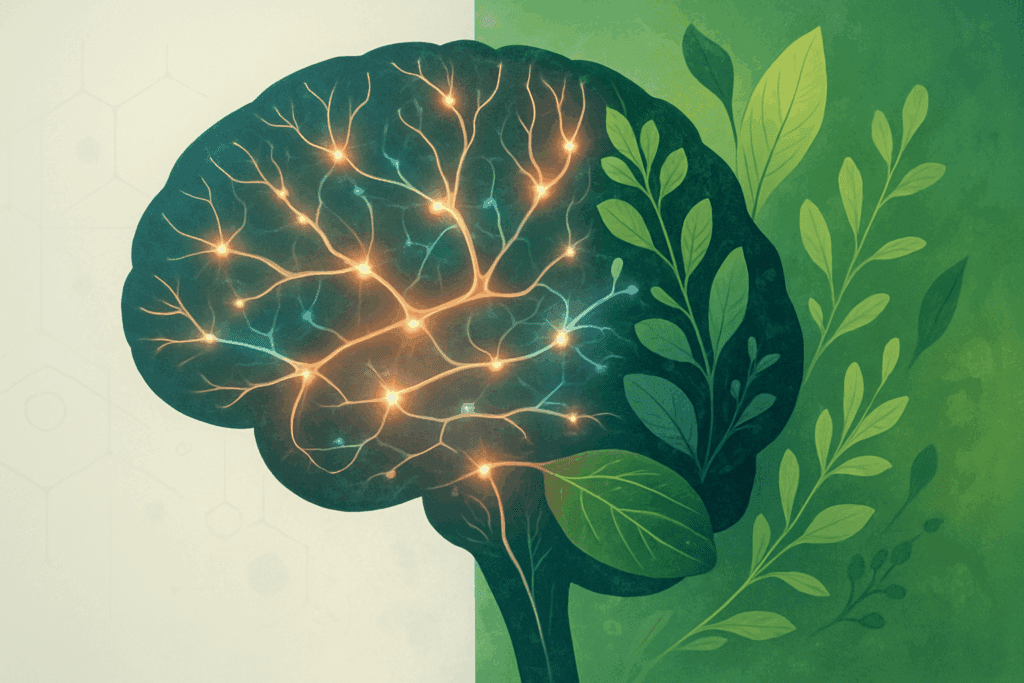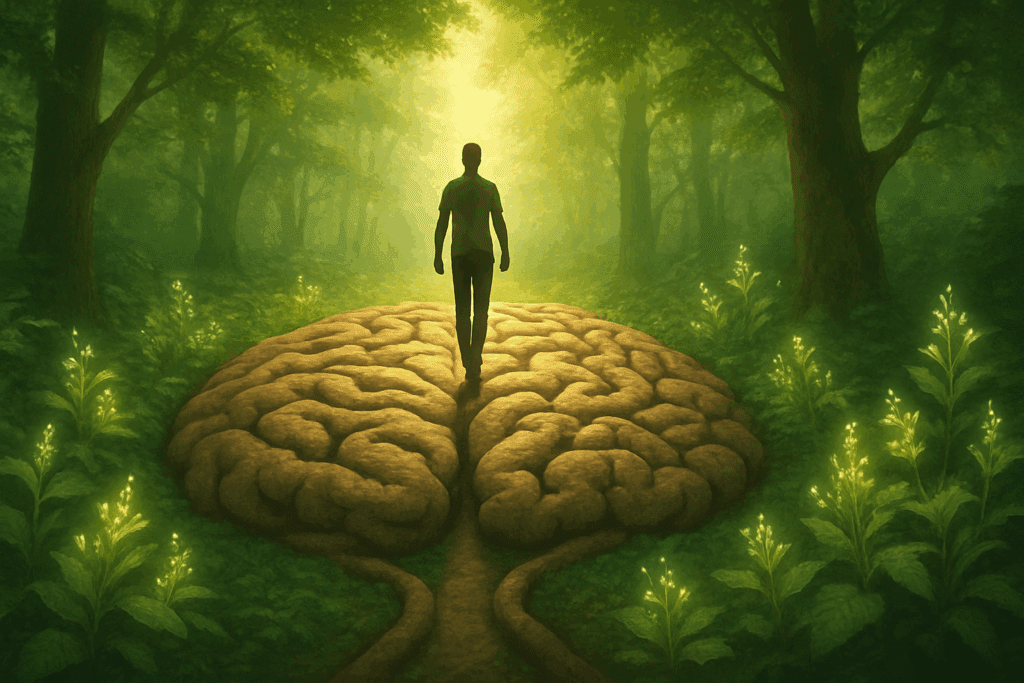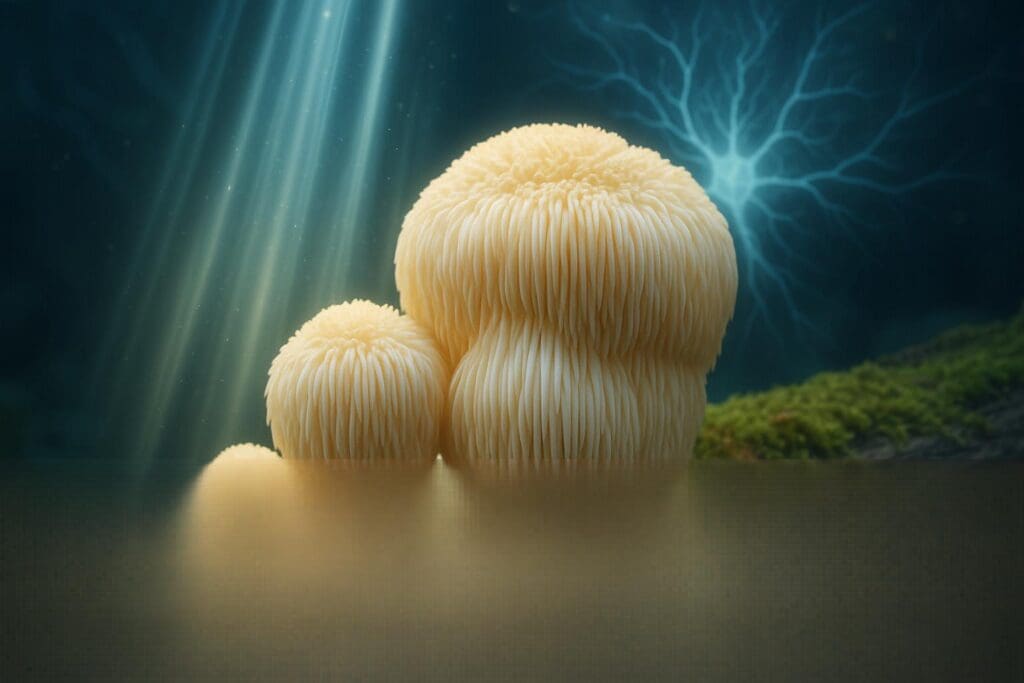In recent years, there has been growing interest in natural remedies for attention-deficit/hyperactivity disorder (ADHD), particularly among adults and women seeking alternatives to pharmaceutical interventions. While medication remains the standard treatment for many, a parallel movement has emerged—driven by both scientific inquiry and consumer demand—to explore herbs and plant-based compounds that may gently support cognitive clarity, sustained attention, and working memory. For anyone wondering how to remember what you read, or searching for the best way to remember what you read for work or study, this exploration of herbs for ADHD presents both timeless wisdom and contemporary science.
You may also like: Best Herb for ADHD? Evidence-Based Natural Remedies That May Support Focus, Memory, and Mental Clarity
ADHD, a complex neurodevelopmental condition, is often associated with inattention, impulsivity, and hyperactivity. However, beyond the diagnostic criteria, many people with ADHD—especially women—experience unique challenges in memory, focus, and information retention. This leads to common questions like “how can I remember what I read” or “how to read and understand and remember dense material.” The promise of herbal support lies in their potential to nourish neurotransmitter systems, reduce oxidative stress, and calm mental restlessness without blunt force effects or dependency risks.

Understanding ADHD and the Need for Natural Cognitive Support
To understand how herbs may help, it’s important first to consider the neurobiology of ADHD. Dopamine dysregulation, imbalanced norepinephrine levels, and underactivity in the prefrontal cortex are some of the underlying mechanisms. Conventional medications target these pathways, often with powerful stimulants. Yet, the search for gentler, holistic alternatives has turned to nature. Certain herbs—long used in traditional medicine systems such as Ayurveda and Traditional Chinese Medicine—have demonstrated potential to influence the very neurotransmitters involved in attention and memory.
Furthermore, people with ADHD frequently seek strategies to better retain information. Whether they’re students, professionals, or lifelong learners, their quest often centers around how to memorize what you read and how to remember everything you read. While no single herb can guarantee total memory recall, some botanicals appear to improve attention span, reduce distractibility, and enhance mental clarity—prerequisites for effective reading comprehension and memory encoding.

Bacopa Monnieri: The Classic Ayurvedic Memory Tonic
Among the most extensively studied herbs for ADHD and cognitive function is Bacopa monnieri. Traditionally known in Ayurveda as “Brahmi,” Bacopa has a centuries-long reputation for enhancing intellect, learning, and memory. Modern science has corroborated many of these traditional claims. Bacopa is believed to exert its effects through modulation of serotonin and dopamine, both vital neurotransmitters in focus and reward processing.
Clinical studies suggest Bacopa may improve working memory, task-related attention, and recall speed. What makes Bacopa especially compelling for those with ADHD is its adaptogenic quality—it appears to reduce anxiety and oxidative stress while supporting mental performance. For someone wondering how to remember more of what you read, Bacopa’s dual ability to calm mental agitation and improve memory formation can be profoundly helpful. Consistent supplementation over several weeks is often necessary, as Bacopa works cumulatively rather than providing an immediate boost.
Ginkgo Biloba: Enhancing Blood Flow and Cognitive Vitality
Ginkgo biloba, derived from one of the oldest living tree species, is another herb widely studied for its impact on memory and cognitive function. Its key mechanism involves increasing cerebral blood flow and offering neuroprotective antioxidant effects. Ginkgo’s ability to enhance oxygen and nutrient delivery to the brain makes it a logical candidate for supporting attention and retention in people with ADHD.
Several studies have examined Ginkgo’s effects on children and adults with ADHD, especially when paired with other supplements. While not a standalone replacement for stimulants, Ginkgo may complement other treatments and provide a noticeable lift in concentration and mental energy. Importantly, for those exploring how to learn to remember what you read or how to remember things you read during long study sessions, improved blood circulation and antioxidant protection can be critical in maintaining mental stamina.

Rhodiola Rosea: Combating Mental Fatigue and Stress-Induced Distraction
One of the more recent entrants into the nootropic conversation is Rhodiola rosea, an adaptogenic herb from the Arctic regions of Europe and Asia. Rhodiola is renowned for its ability to enhance resilience to stress and fight fatigue—two key concerns for individuals with ADHD. Chronic mental fatigue often hampers the ability to read attentively and recall information afterward.
Rhodiola’s bioactive compounds, such as rosavins and salidroside, support balanced cortisol levels and help maintain cognitive energy under stress. This can be especially useful during high-pressure academic or professional periods. For someone striving to improve how to memorize what you read in preparation for exams or deadlines, Rhodiola can help prevent burnout and sustain productivity. Moreover, it may support synaptic plasticity, an essential feature of memory formation.
Panax Ginseng: Stimulating Mental Energy Without the Crash
Panax ginseng, commonly referred to as Korean or Asian ginseng, has a long-standing reputation for boosting physical and mental energy. Its ginsenosides may influence dopamine and acetylcholine levels, which are critical for attention and learning. In contrast to caffeine-based stimulants, ginseng offers a more balanced form of mental alertness that doesn’t typically lead to a post-peak crash.
Research supports Panax ginseng’s role in enhancing cognitive performance and reducing mental fatigue. Some studies even show benefits in working memory and task execution, especially in older adults or those with mild cognitive impairments. For readers hoping to improve how to read and remember what you read, ginseng offers a focused, energizing state of mind that is conducive to both comprehension and memory.

Gotu Kola: The Nervine Herb for Calm Focus
Often overshadowed by its botanical cousins, Gotu kola (Centella asiatica) is a powerhouse for brain health, particularly in Ayurvedic and Southeast Asian traditions. Known as a nervine tonic, Gotu kola supports the nervous system by promoting relaxation without sedation. This makes it uniquely suited for those with ADHD who experience restlessness or racing thoughts.
Gotu kola’s triterpenoid compounds help enhance circulation to the brain, reduce anxiety, and support neurogenesis. When taken regularly, it may aid in improving concentration and reducing mind-wandering. For individuals exploring how to remember things you read while remaining emotionally grounded, Gotu kola offers a gentle yet effective support system. Its relaxing yet clarifying effects make it ideal for evening study sessions when overstimulation might otherwise interfere.
L-Theanine and Green Tea Extract: Synergistic Support for ADHD
Though technically an amino acid rather than an herb, L-theanine from green tea deserves mention for its unique impact on brain function. L-theanine promotes alpha brain wave activity—a state associated with calm focus and creative problem-solving. For people with ADHD, the combination of L-theanine’s calming effects with low-dose caffeine from green tea can provide a smooth, non-jittery increase in alertness.
This synergy is especially valuable when tackling long reading assignments or technical material. If you’ve ever wondered how to read and understand and remember dense information, the alert-calm state induced by L-theanine may be the key. It fosters the mental quietness needed for deeper absorption while still keeping the mind energized. Moreover, it helps buffer the overstimulation that caffeine alone might cause in sensitive individuals.
Lion’s Mane Mushroom: Neurogenesis and Long-Term Cognitive Enhancement
Lion’s mane mushroom (Hericium erinaceus) is gaining popularity in both academic research and biohacking circles due to its potential to stimulate Nerve Growth Factor (NGF) production. NGF plays a crucial role in the growth, repair, and survival of neurons. This is particularly relevant for those with ADHD, as impaired neuroplasticity has been associated with executive dysfunction and poor working memory.
Regular use of lion’s mane may support brain cell regeneration, enhance synaptic communication, and fortify neural pathways involved in attention and learning. Its benefits are not usually immediate but build over time. For people exploring how to remember everything you read and retain complex ideas across days or weeks, lion’s mane may provide the structural brain support needed for deep learning.
Saffron: A Bright Addition to Mood and Cognitive Balance
Saffron, often prized for its culinary and colorant value, has also shown promise as a mood and memory enhancer. Research indicates that saffron extract may be as effective as certain antidepressants in alleviating mild-to-moderate depression, which is often comorbid with ADHD. Mood stabilization can significantly impact cognitive clarity and motivation.
Active compounds like crocin and safranal are believed to modulate serotonin and dopamine levels in the brain. In doing so, saffron supports emotional equilibrium and can improve attentional capacity. For people searching for the best way to remember what you read when dealing with emotional overwhelm, saffron may offer both cognitive and emotional clarity.
Turmeric and Curcumin: Anti-Inflammatory Allies for Cognitive Health
Inflammation is increasingly recognized as a contributing factor in cognitive dysfunction, including the brain fog that often accompanies ADHD. Curcumin, the active compound in turmeric, has powerful anti-inflammatory and antioxidant properties that may protect brain cells from oxidative damage. Emerging research suggests curcumin supplementation may enhance attention, working memory, and mood.
For individuals interested in how to remember more of what you read while also addressing the broader health context, turmeric provides a well-rounded option. When paired with black pepper extract (piperine), curcumin’s bioavailability significantly increases, enhancing its cognitive benefits. This combination supports a resilient brain environment that’s more receptive to learning and memory.
Final Thoughts: Reclaiming Focus Through Nature’s Intelligence
While herbal supplements are not a replacement for medical treatment in ADHD, they offer a compelling complement—especially for those who seek more natural pathways to mental clarity, emotional regulation, and memory retention. Each herb discussed here provides a different route to enhancing attention and recall, supporting those who want to improve how to memorize what you read, how to learn to remember what you read, and how to remember things you read when life demands mental sharpness.Frequently Asked Questions (FAQ)

What role do sleep and circadian rhythms play in managing ADHD symptoms and supporting memory retention?
Sleep is a crucial yet often overlooked factor in ADHD management and cognitive health. Poor sleep quality can exacerbate attention issues and impair the brain’s ability to consolidate memories. Maintaining consistent sleep patterns helps regulate neurotransmitter activity, especially dopamine and norepinephrine, which are already imbalanced in many individuals with ADHD. Proper circadian alignment also plays a key role in how to prevent cognitive decline, as disrupted sleep is linked to accelerated aging of the brain. Prioritizing high-quality sleep not only reduces hyperactivity and mood swings but also supports long-term efforts in how to reverse cognitive decline and how to recover from cognitive impairment, making it a foundational strategy in natural ADHD care.
Can certain dietary habits enhance the effectiveness of herbs used for ADHD and memory support?
Yes, specific dietary choices can significantly amplify the benefits of herbal remedies. Nutrients like omega-3 fatty acids, B-vitamins, magnesium, and zinc are known to improve neurotransmitter function and neuroplasticity. A Mediterranean-style diet rich in fruits, vegetables, lean proteins, and healthy fats supports both mental clarity and emotional stability. These nutritional elements are particularly important when exploring how to prevent cognitive decline because they help preserve neuronal integrity and reduce inflammation. For those integrating herbs into their routine, a brain-healthy diet complements these efforts and offers added protection for those aiming to understand how to recover from cognitive impairment in a sustainable, food-based way.
Is there a connection between gut health and ADHD symptoms?
Emerging research strongly suggests that the gut-brain axis plays a critical role in ADHD expression. Imbalances in gut microbiota can lead to systemic inflammation and reduced synthesis of neurotransmitters like serotonin and GABA, which influence mood and focus. Restoring gut balance through prebiotics, probiotics, and fiber-rich diets may therefore improve mental function. This connection also highlights the potential role of digestive health in strategies on how to reverse cognitive decline. When gut health is prioritized, it supports a more stable mental baseline and enhances the body’s ability to recover from cognitive impairment more effectively.
How important is physical activity for cognitive recovery and focus in ADHD?
Regular physical activity enhances dopamine transmission, improves executive function, and increases brain-derived neurotrophic factor (BDNF), which supports learning and memory. For individuals with ADHD, exercise offers immediate improvements in attention and mood while also promoting long-term brain health. Activities like aerobic exercise, yoga, or even rhythmic movement such as dance can be particularly effective. These benefits align with best practices on how to recover from cognitive impairment, especially in individuals recovering from trauma or prolonged stress. Incorporating movement into daily routines is an underappreciated yet powerful method for those seeking how to prevent cognitive decline naturally and holistically.
What are the risks of relying solely on herbal supplements without medical supervision?
While herbs can offer compelling support for ADHD and memory, they are not without potential risks. Some botanicals may interact with medications or affect underlying health conditions. Additionally, not all supplements are standardized, leading to inconsistencies in dosage and potency. Relying on unverified supplements may compromise rather than support efforts in how to reverse cognitive decline or how to recover from cognitive impairment. A functional medicine or integrative health professional can help design a customized plan that balances safety with efficacy, ensuring that natural remedies serve as an adjunct—not a replacement—for evidence-based care.
Can mindfulness practices enhance the effectiveness of herbs for ADHD?
Mindfulness techniques like meditation, breathwork, and body scanning have been shown to improve attention span, emotional regulation, and working memory—all of which are challenged in ADHD. When paired with herbs that support focus and calm, such as L-theanine or Gotu kola, mindfulness deepens their effects by promoting neuroplasticity. Long-term mindfulness practice has also been associated with increased cortical thickness in regions associated with attention and sensory processing. These structural changes underscore mindfulness’s value in strategies aimed at how to prevent cognitive decline and how to recover from cognitive impairment with non-invasive, accessible tools. When combined with botanical support, mindfulness becomes a cornerstone of holistic cognitive care.
What are the early signs that herbal remedies are starting to work for cognitive enhancement?
Subtle shifts in attention, mood stability, and reduced mental fatigue are often the first signs that herbs are taking effect. Improvements may include the ability to stay focused on tasks longer, fewer interruptions in thought flow, and increased mental endurance during reading or studying. These changes typically appear within two to six weeks, depending on the herb and dosage. Tracking these early indicators can reinforce confidence in natural interventions and offer measurable markers of progress. This experiential feedback loop is particularly useful for individuals exploring how to recover from cognitive impairment or how to reverse cognitive decline through consistent, natural strategies.
Are there gender-specific considerations when choosing herbs for ADHD and memory?
Yes, hormonal fluctuations—especially estrogen and progesterone—play a significant role in modulating attention and memory in women. Herbs like Rhodiola and Bacopa may interact differently depending on the menstrual cycle or menopausal stage. Women with ADHD often experience symptom flare-ups during perimenopause or the luteal phase of their cycle, suggesting that timing and dosage should be personalized. Understanding these nuances enhances the effectiveness of herbal care while also supporting broader goals like how to prevent cognitive decline as women age. By aligning herb use with hormonal rhythms, women may better recover from cognitive impairment and stabilize attention throughout their lifespan.
How do environmental toxins influence ADHD symptoms and cognitive function?
Exposure to heavy metals, pesticides, and synthetic chemicals can impair mitochondrial function, increase oxidative stress, and reduce neurotransmitter synthesis. These effects not only exacerbate ADHD symptoms but may accelerate brain aging. Detoxification strategies—such as sauna therapy, antioxidant-rich diets, and chelation under medical supervision—can support brain resilience. Mitigating toxic exposure aligns with emerging approaches on how to prevent cognitive decline by addressing root causes rather than symptoms. Additionally, reducing environmental toxic load can enhance the efficacy of herbs and other lifestyle interventions aimed at helping individuals recover from cognitive impairment over the long term.

What role does lifelong learning play in maintaining cognitive resilience in ADHD?
Engaging in new, mentally challenging activities stimulates neurogenesis and strengthens synaptic networks. For individuals with ADHD, learning a new language, playing a musical instrument, or participating in creative projects can build attention stamina and boost memory. This concept of cognitive enrichment is central to how to prevent cognitive decline by fostering brain adaptability. Furthermore, purposeful learning acts as cognitive rehabilitation for those aiming to recover from cognitive impairment due to aging, injury, or chronic stress. Lifelong learning, when paired with herbal and lifestyle strategies, creates a multidimensional framework for maintaining sharpness and mental clarity across all stages of life.
It is essential, however, to approach herbal supplementation with both curiosity and caution. Not all herbs are suited for everyone, and some may interact with medications or underlying health conditions. Working with a qualified health professional can help tailor a botanical strategy that is safe, effective, and aligned with your unique neurobiology. When used wisely, these herbal allies can help light the path toward improved attention, sharper memory, and deeper cognitive well-being.
As science continues to uncover the intricate ways plants influence brain health, the conversation around the best herb for ADHD remains dynamic and evolving. Whether you’re a student grappling with information overload, a professional striving for sustained focus, or someone simply eager to remember everything you read more effectively, nature’s medicine cabinet may hold a key to unlocking your full cognitive potential.
Further Reading:
Further Reading: Buffer Your ADHD Brain for Greater Clarity and Focus
Natural Relief for Symptoms: Top Herbs for ADHD Treatment and Management


